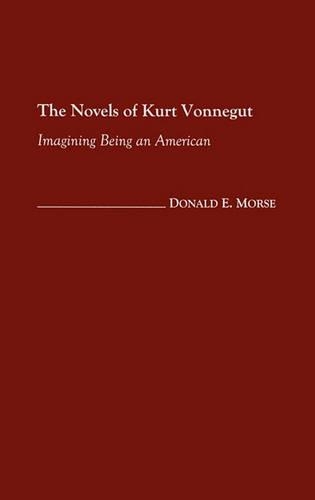
The Novels of Kurt Vonnegut: Imagining Being an American
(Hardback)
Publishing Details
The Novels of Kurt Vonnegut: Imagining Being an American
By (Author) Donald Morse
Bloomsbury Publishing PLC
Praeger Publishers Inc
30th July 2003
United States
Classifications
General
Non Fiction
Literary studies: c 1900 to c 2000
813.54
Physical Properties
Hardback
232
Width 156mm, Height 235mm
482g
Description
Vonnegut belongs to what Emerson called the part of hope - but clearly restricted to this world. This title discusses all of Vonnegut's novels against the background of his other writing, events of the 20th century and the vast array of Vonnegut scholarship. In his novels he speaks eloquently and succinctly for his generation of Americans - the central generation of 20th-century Americans - thus making him the representative 20th-century American writer. His novels reflect the major traumatic public and private events that have gone into imagining being an American during that century, including the Great Depression, World War II, the Bomb, Vietnam, the weakening of social institutions, the vicissitudes of marriage and family, divorce, growing old, experiencing loss and anticipating death. The study presents a clear, well-argued view of Vonnegut's work within the context of American literature and history. Like the majority of American writers, Vonnegut is a moralistic novelist, but one who employs humour to drive home his ethical points. In many respects he most clearly resembles Mark Twain not only in being a highly ethical novelist, but also in the use of his comedy. His books serve a remarkable range of purposes - social commentary, theological discussion, ethical argument, parody, satire and prophecy. His work reflects his strong belief in the dignity and worth of all individuals, and as an American pragmatist, he reminds his readers again and again of the unfinished nature of America.
Reviews
[D]iscusses Vonnegut's position as an American pragmatist whose work reflects the power and dignity of the individual and the unfinished evolution of the United States.-Brief Mention
Morse has done a fine job of casting light on this defining aspect of Vonnegut's work.-Utopian Studies
Morse intends this study of Vonnegut's peculiarly American identity as a novelist to bring the novelist's work to lay readers, students, and Vonnegut scholars. Intelligent and comprehensive, the book should be successful in this stated goal, joining the dozens of previous studies that have celebrated and analyzed this significant author's simultaneous accessibility and profundity....Recommended. All collections; all levels.-Choice
"Discusses Vonnegut's position as an American pragmatist whose work reflects the power and dignity of the individual and the unfinished evolution of the United States."-Brief Mention
"[D]iscusses Vonnegut's position as an American pragmatist whose work reflects the power and dignity of the individual and the unfinished evolution of the United States."-Brief Mention
"Morse has done a fine job of casting light on this defining aspect of Vonnegut's work."-Utopian Studies
"Morse intends this study of Vonnegut's peculiarly American identity as a novelist to bring the novelist's work to lay readers, students, and Vonnegut scholars. Intelligent and comprehensive, the book should be successful in this stated goal, joining the dozens of previous studies that have celebrated and analyzed this significant author's simultaneous accessibility and profundity....Recommended. All collections; all levels."-Choice
Author Bio
DONALD E. MORSE is Professor of English and Rhetoric, at Oakland University, Fulbright Lecturer at Kossuth University, Hungary, 1987-1988, and Conference Chair for the International Association for the Fantastic in the Arts.
